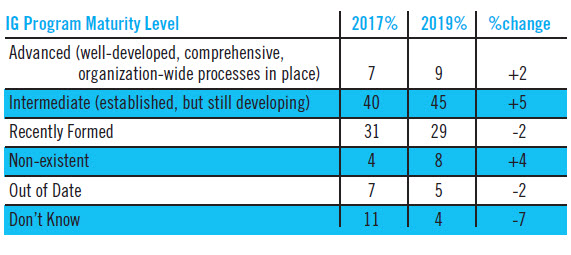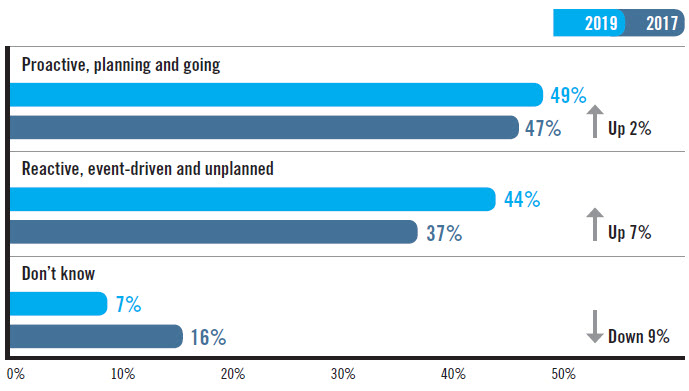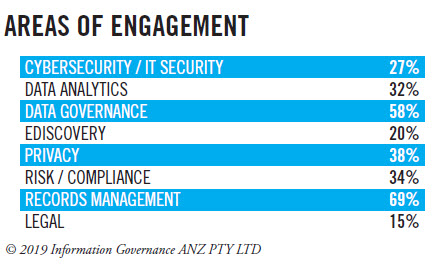IG ANZ 2019 IG Survey
[glossary_exclude]InfoGovANZ is an organization founded to further the adoption of IG principles and practices in Australia and New Zealand. IGANZ (www.infogovanz.com) conducted its first IG survey in 2017. This year, they repeated the IG survey and the results provide an interesting insight into the growing maturity of IG programs in the region.
The 2019 survey collected results from 340 industry professionals. InfoGovANZ requested and received cooperation from a number of organizations whose members submitted survey responses. This outreach enabled IG ANG to include responses from a broad range of professionals in their survey results:
reference featured image for engagement graphic
The three main drivers of IG projects were identified as:
- Good Business Management Practices (up 16% from 2017)
- External Regulatory, Compliance, or Legal Obligations
- Internal Technology Restructuring or Transition.
The IG Survey results highlight the fact that a significant number (46%) of organizations are using an IG framework to guide their IG programs. The survey identified these activities and solutions as the most important in their IG projects:
- Implementing an IG framework (46.0%)
- Compliance with Privacy Regulations (16.2%)
- Data Loss Prevention (10.4%)
- Big Data Analytics (6.8%)
- Decommissioning an archive or system (2.3%)
- Other (6.9%)
Other factors which are significant drivers of IG projects include changes in privacy laws such as GDPR and Australia’s Notifiable Data Breach Scheme, with 42% of respondents indicating that the new regulatory environment is driving their IG projects.
IG Maturity was a metric that offers insight when compared with the 2017 results.

Combined, the Advanced and Intermediate IG Maturity levels in 2019 total 54%, a 7% increase over 2017. Interestingly, this increase in Maturity corresponds with the 7% decrease in those respondents who did not know the Maturity level of their IG program.
When asked to rate their organization’s approach to IG programs, the responses indicated a fairly even split between proactive and reactive approaches:

It is possible that these results correlate with the responses to IG leadership. For example, when asked if a Chief Information Governance Officer is essential to IG Success, 56% said ‘Yes’, 14% said ‘No,’ and 30% were on the fence. In another question, respondents were asked if their organization had addressed IG leadership. In this case, the answers were: 35% ‘Yes’, 47% ‘No,’ and 18% ‘Don’t Know.’ The 47% of organizations whose representative answered ‘No’ to the leadership question are likely a big part of the 44% whose approach to IG programs is reactive.
Another question about IG leadership asked if the individual accountable for IG in the organization was a peer of the C-Suite (senior executives). The responses were: 41% ‘Yes,’ 46% ‘No,’ and 13% ‘Don’t Know.’ The 46% of respondents who answered ‘No’ to this question are also likely to be members of the organizations whose responses are reactive.
Overall, these results highlight the key aspect of Executive Leadership in IG program success.
The final survey question points to good news for the IG Market space: 33% of organizations plan to increase their IG spending, a response which increased 7% over 2017.
The information presented in this article was taken from the IG Industry Survey, July 2019 Report. The full report is available for download on the InfoGovANZ website (www.infogovanz.com).[/glossary_exclude]
recent posts
You may already have a formal Data Governance program in […]

